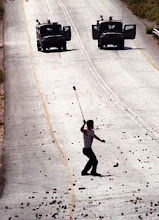However, if my stuffy nose and watery eyes are proof, nights can be chilly. Especially if you're a Palestinian living in Sheikh Jarrah, in East Jerusalem. A small neighborhood north of the Old City, on the Ramallah-Jerusalem route taken by bus #18, Sheikh Jarrah is ground zero for Israeli expanisionist plans and ethnic cleansing of Palestinians. A small group of international solidarity activists huddle around the fire outside the makeshift tent of the Al-Ghawi family, set up and destroyed (five times) since August 2, 2009.

That day, 53 Palestinians from two families (the Al-Ghawi and Hanoun families) were violently evicted from their houses by Torah-wielded and rock-throwing settlers, a number of them of French and American dsecent. Some looked like your regular old stoned out hippies sporting NorthFace backpacks. (Occupation isn't carried out by hulking monsters with big fangs; it's the apparent normality of it that scares you.) Since then, a number of young couples pushing Prospect Park-style super baby carriages have occupied the home, celebrating Hannukah with a giant Menorah on the rooftop, smugly overlooking the Al-Ghawi family across the street, sipping a coffee or tending to their baby. The settlers are watched 24 hours-a-day by private guards and police, while solidarity activists hold their own 24-hour vigil against settler attacks.
Nearby, from outside the Al-Kurd family home, occupied in December of 2009, you can peer through the window and (creepily, I admit) watch the (even creepier) young settlers bed down for the night on mattresses amidst strewn clothes and furniture. It more resembles a college dorm. And that's the salt on the wound: these settlers aren't 'settling' in just yet; they are keeping the Al-Kurd family out until this month's hearing in a Jerusalem court. Meanwhile, Mr. Al-Kurd receives guests in his tent, located inside the compound, and we watch, nonplussed, as the settlers side-step the tent and into the house. It's in your face.
The Sheikh Jarrah neighborhood was given to 28 families in 1956, following an agreement between the UN and the Jordanian government, then in control of Jerusalem and the West Bank. The families had been refugees of the earlier 1948 expulsion of Arabs from Palestine. However, after the 1967 occupation of East Jerusalem and the West Bank, the Sephardic Community Committee and the Knesseth Yisrael Association presented claims that the land was historically Jewish and thus, sought the eviction of the Palestinian families. A secret agreement between the two parties' lawyers allowed for legal recognition of Jewish ownership of the land, and Palestinians as protected tenants, which has used to evict families considered mere "tenants". Other Ottoman-era documents disprove original Jewish ownership.
Historical documents aside, there is open suspicion that settlers want this land in order to form a continuum of Jewish ownership over East Jerusalem, stretching from the Old City to Hebrew University and onto the West Bank settlements, which would effectively cut off the Old City to Northern Jerusalem Palestinian neighborhoods. Evictions, coupled with house demolitions and restriction on building permits for Palestinians, are the tool to complete this plan. Immediately southeast of Sheikh Jarrah, in Wadi Hoz and Silwan and neighboring communities, Palestinians are being silently pushed out.
Though Jerusalem's Palestinians (ironically considered "citizens" of Israel, compared to their West Bank counterparts) comprise of close to 35% of the city's population, only 5-10% of the municipal budget is spent in their areas, according to a confidential EU report published last year.
While settler violence in Sheikh Jarrah - including stonings, knifings, spray painting and harassment - continues unstopped, many Palestinians and activist have been detained. Every Friday, Israeli activists supporting the evicted families try to march to Sheikh Jarrah but are stopped, gassed and cuffed. One international activist, Ryan Olander, from Minnesota, has been in jail for 3 weeks, pending deportation.
Last night, the settlers had friends over for what I imagined to be a delicious Shabbat dinner. It was hard to stomach seeing the happy smiles and warm hugs exchanged at the doorstep, especially as the al-Ghawi family watched this tragicomedy unfold from the street outside their own home. Mr. al-Ghawi's was shaking with rage as he hassled them in Hebrew. Some settlers looked away, while others yelled back and hustled their sleeping babies upstairs.
Just a few days ago, Defense Minister (the title 'Minister' sounds so esteemed; can we use 'Thug'?) Barak declared that building permits for the West Bank settlements will be allowed to be issued, reneging on the administration's proposed 10-month 'freeze', already 6 weeks into effect. This would allow constructions on homes to be built the day the 'freeze' ends. It's all a joke. The West Bank settlements continue to expand and East Jerusalem is slipping away. All the while, Middle East 'envoys' and 'negotiators' express 'dismay' or 'regret' that Israel is continuing its expansionist plan. Tony Blair, a frequent guest at the American Colony Hotel (fitting for Blair, I believe), has only to walk 200 meters from the hotel to see what is really happening every day (and night) in Sheikh Jarrah, but the clown is obviously too busy pulling in the cash from his lecture series.
Meanwhile, for what it's worth, we'll continue to come out, endure the 'freeze' and bear witness to Israel's ethnic cleansing of Jerusalem. You can support by writing a letter to your representatives asking them to demand Israel remove the illegal settlers from the Sheikh Jarrah families' homes. For more information, you can see the International Solidarity Movement's website: www.palsolidarity.org
.


No comments:
Post a Comment